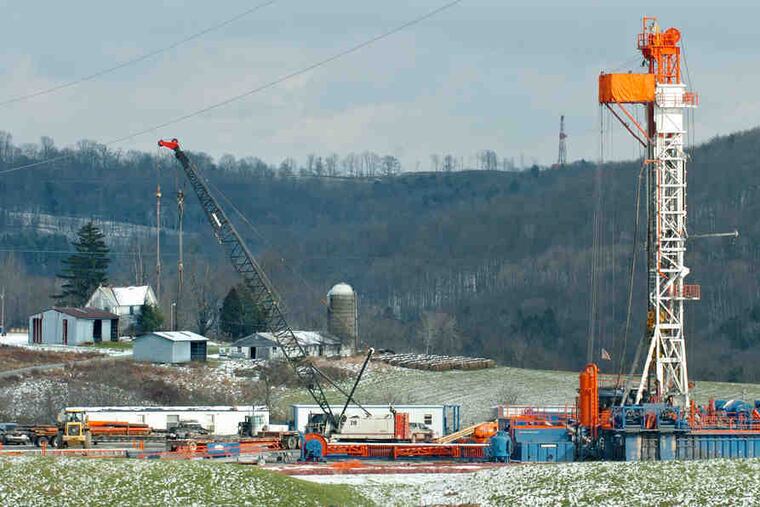PhillyDeals: Are Pa. laws really scaring off oil giants?
Sid Smith is from Houston. He goes home to hunt and fish on his uncle's Texas ranch. But he lives on the Main Line and makes his living from his Market Street office, leasing buildings in Center City, King of Prussia, and other office centers as managing partner for the national agency Newmark Knight Frank Smith Mack.

Sid Smith
is from Houston. He goes home to hunt and fish on his uncle's Texas ranch.
But he lives on the Main Line and makes his living from his Market Street office, leasing buildings in Center City, King of Prussia, and other office centers as managing partner for the national agency Newmark Knight Frank Smith Mack.
You'd figure his Texas connections would make Smith the right guy to ask about Gov. Corbett's plan to make Pennsylvania "the Texas of the natural gas boom" and persuade energy giants to "headquarter" here. To make that happen, as Corbett said in his budget message last week, Pennsylvania should avoid the billion-dollar fees other states charge natural gas drillers.
Pennsylvania was America's petroleum pioneer, but its sweetest wells were sucked dry long ago.
Oil giants born and financed here - Gulf, Atlantic Richfield, Pennzoil - quit the commonwealth and moved their high-paid bosses and job-rich contractors south and west, leaving only Philadelphia's shrunken Sunoco Inc.
Corbett hopes fee-free wells will attract natural gas companies' head offices, not just the drill rigs and waste-recycling tanks already working the ridges above the deep Marcellus and deeper Utica shales.
Smith knows Texas, and he knows corporate real estate. Do Corbett's promises have Smith prospecting Houston and Dallas companies to move north? Is Smith's phone ringing?
Not now. "We could find room for them. But they're not dying to come back," said Smith, standing between office maps of colonial Philadelphia and topographical Texas.
Smith doesn't see Pennsylvania's zero percent gas-extraction fee as a convincing draw, compared with Texas' 4 percent levy. The way he sees it, "Companies want the gas, and they'll pay the tax."
But in declining to set an extraction tax, Pennsylvania may be passing up a good thing that could benefit all industries.
Texas' energy taxes raise so many billions that the state doesn't charge an income tax.
If Corbett really wants to make Pennsylvania like Texas, why doesn't he try that?
One-stop Houston
It's not clear that extraction taxes are the main factor Texas energy bosses would consider before selling their ranches and moving here with their Stetsons (an old Philly brand).
When companies want to move to Houston, Smith says, a single regional agency handles real estate, leasing, licensing, and tax questions.
Houston weather is steamy-Philly-August most of the year, and the chain shops have that drive-by Interstate-bypass lack of character. But for business, Houston is one-stop shopping, enabling a tenant to quickly check costs and opportunities at multiple sites and make a solid decision regarding a move.
By contrast, clients from out of town freeze in disbelief, Smith says, when he explains about the Philadelphia region's hundreds of boroughs, cities, and townships, each with its own planning and zoning rules; the competing counties; multiple property-tax districts; high state business income-tax rates; and tricky discounts, among other complications.
Prospects feel "We [Pennsylvania] are over-governed," Smith says.
His firm manages properties such as the Wanamaker Building (where tenants include David Kramer's fast-growing Digitas-Razorfish advertising group), 1818 Market St., and 1101 DeKalb Pike in King of Prussia.
As an outdoorsman, Smith is a little concerned about the impact of drilling byproducts and wastewater accumulating up in the hills in the rush to open more wells. "Ponds like that are never a good story on any property," he told me.
But a believer
Still, Smith is a Philly believer. "There's a national misperception about Philadelphia," due to ignorance and a low public profile, Smith says. "My friends from home are always impressed [when here]."
Smith steers possible out-of-town tenants past the township halls and straight to the region's lifestyle attractions: its private golf clubs, suburban and prep schools, medical institutions, art and cultural centers, and the restaurants, high and humble, in their profusion and variety.
In this Texas transplant's world, getting the real Philly story out, and simplifying our government-nuisance factor, could do more to boost Pennsylvania business than special treatment and wishful thinking for the energy business.
Taxman says
"As a share of the U.S. economy, taxes are at the lowest level than they have been since 1950," says
Tom Bloch
, son of
H&R Block
founder
Henry Bloch
and until last year a director of the leading U.S. tax-prep firm.
"Yet there is no denying the fact that many Americans, including some highly vocal politicians, are convinced that taxes are still too high," the younger Bloch told me, while traveling the country plugging his new book about his father and taxes, Many Happy Returns.
"Considering the size of our nation's deficit, however, Congress will have no choice, in my opinion, but to raise taxes sooner rather than later," he added.
"I also believe that the rich are significantly undertaxed compared to the middle class. That's why I suggest that raising taxes on the very wealthiest taxpayers must be the first step toward restoring equity in our income-tax system, and ensuring the financial security of our children's future."
He would say that, wouldn't he? He's the taxman, and when we pay, he gets a cut, no? But the Blochs sold the company to the public, and the son stepped down from the company's board last year, leaving hedge fund manager Richard Breeden, a former Securities and Exchange Commission chairman and Block's largest stockholder, in control.